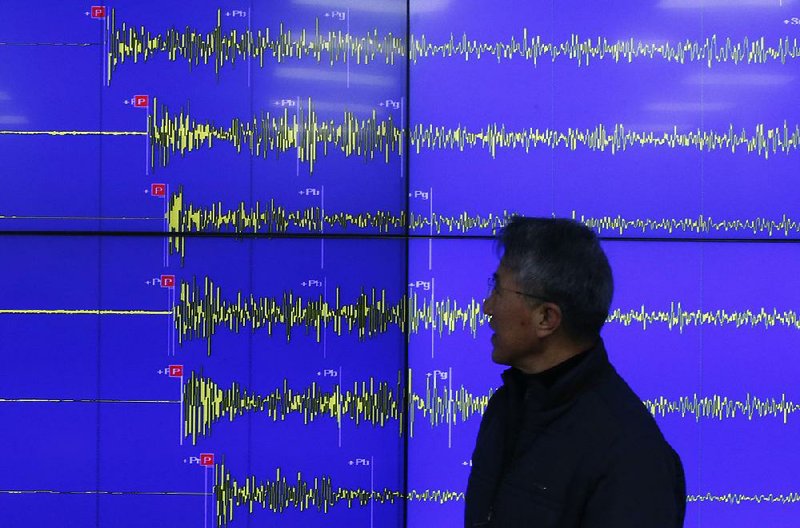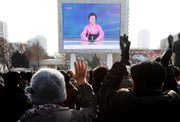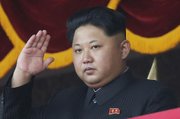SEOUL, South Korea -- North Korea's declaration that it had tested a hydrogen bomb for the first time was greeted with widespread condemnation and skepticism.
World powers vowed Wednesday to punish North Korea with new international sanctions, with the United Nations saying it "strongly condemns" the test.
The test was unexpected partly because North Korea's last one was nearly three years ago and its leader, Kim Jong Un, did not mention nuclear weapons in his annual New Year's speech.
There was a burst of jubilation and pride in North Korea's capital, Pyongyang, where a TV anchor said Wednesday's test of a "miniaturized" hydrogen bomb had been a "perfect success" that elevated the country's "nuclear might to the next level."
But an early analysis by the U.S. government was "not consistent with the claims that the regime has made of a successful hydrogen bomb test," White House spokesman Josh Earnest said.
He added that nothing has happened in the past 24 hours to change Washington's assessment of Pyongyang's technical or military capabilities. The U.S. is still doing the work needed to learn more about the North's test, he added.
Hours earlier, South Korea's spy agency said it thought the estimated explosive yield from the blast was much smaller than what even a failed hydrogen bomb detonation would produce.
In South Korea, lawmaker Lee Cheol Woo said he was told in a briefing by the National Intelligence Service that Pyongyang may not have conducted a hydrogen bomb test given the relatively small size of the seismic wave reported.
An estimated explosive yield of 6.0 kilotons and a quake with a magnitude of 4.8 (the U.S. reported 5.1) were detected, Lee said. That's smaller than the estimated yield of 7.9 kilotons and 4.9-magnitude quake reported after a 2013 nuclear test, he said, and only a fraction of the hundreds of kilotons that a successful H-bomb test would ordinarily yield. Even a failed H-bomb detonation typically yields tens of kilotons, the National Intelligence Service told Lee, who sits on the parliament's intelligence committee.
A miniaturized H-bomb can trigger a weak quake, but only the U.S. and Russia have such weapons, Lee cited the intelligence service as saying.
U.N. condemnation
The U.N. Security Council met in an emergency session and called the test "a clear violation" of its resolutions and said it "strongly condemns" the test. It agreed to take "further significant measures" in the event of another test and said it would work immediately on a new sanctions resolution in light of "the gravity of this violation."
The isolated country's fourth nuclear test since 2006 was a "reckless challenge to international norms of behavior and the authority of the U.N. Security Council," said British Ambassador Matthew Rycroft.
U.S. Ambassador Samantha Power said the international community must respond with "steadily increasing pressure" and rigorous enforcement of existing measures.
U.N. Secretary-General Ban Ki-moon, a former South Korean foreign minister, called North Korea's action "profoundly destabilizing for regional security," and he demanded that Pyongyang halt any further nuclear activities.
Four rounds of U.N. sanctions have aimed at reining in the North's nuclear and missile development, but Pyongyang has ignored them and moved ahead with programs to modernize its ballistic missiles and nuclear weapons.
The council last approved sanctions against North Korea three weeks after Pyongyang's third nuclear test, on Feb. 12, 2013.
U.N. diplomats, speaking on condition of anonymity because talks have been private, said a new resolution would aim to add more people to the sanctions list, including those linked to a key procurement company, and limit the travel of senior North Korean officials.
Ukraine's U.N. envoy said none of the 15 Security Council members spoke out against imposing new sanctions against North Korea during the private meeting.
Ambassador Volodymyr Yelchenko told reporters that China said nothing in the meeting beyond its "standard" comments on North Korea's nuclear situation. China did not comment to reporters after the meeting.
Russian Ambassador Vitaly Churkin said that what is needed are "cool heads ... proportionate response." He said it would be going "too far" to say that Russia supports more sanctions against North Korea.
New Zealand Ambassador Gerard van Bohemen said he hoped there would be new sanctions.
Japan's U.N. Ambassador Motohide Yoshikawa said the Security Council will hurt its credibility if it fails to swiftly adopt a new resolution imposing "significant" new measures against Pyongyang.
He would not go into detail on what kinds of punitive measures Japan would like to see, saying that must be discussed among the council's members.
'Cannot allow this'
Leaders from across the region and around the world denounced the test.
South Korean President Park Geun-hye ordered the military to bolster its combined defense posture with U.S. forces. She called the test a "grave provocation" and "an act that threatens our lives and future."
Japanese Prime Minister Shinzo Abe said, "We absolutely cannot allow this."
U.S. Defense Secretary Ashton Carter spoke by phone with his South Korean counterpart, Han Min-Koo, and they agreed a North Korean nuclear test would be an "unacceptable and irresponsible provocation," said Carter's spokesman, Peter Cook.
Cook said Carter reaffirmed the U.S. treaty commitment to defend South Korea, which he said includes "all aspects of the United States' extended deterrence" -- referring to a long-standing U.S. promise to defend South Korea with nuclear weapons if necessary.
"Carter and Han agreed that North Korea's provocations should have consequences," Cook said.
The Ministry of Foreign Affairs of China, one of North Korea's few international allies, denounced the test.
"China strongly opposes this act," said Hua Chunying, spokesman for the ministry, at a news conference in Beijing. "China will firmly push for denuclearization of the Korean Peninsula."
As recently as October, China had received assurances from North Korea that it would stop its nuclear tests. It had agreed to send a senior official to a military parade in the North Korean capital -- the first such visit since Kim took power in 2011 -- partly on the condition that the North would refrain from nuclear tests, several U.S. diplomats said.
On Wednesday, Chinese officials sidestepped questions about whether they would level economic sanctions against North Korea. Beijing is Pyongyang's largest economic ally, with trade between the two countries having totaled $6.4 billion in 2014.
Many in China have questioned their government's alliance with the North, though some say it is important to have friends in the region.
After the test was announced, others said they were growing anxious about the North's actions.
In Yanji, a border city, residents reported feeling tables and chairs shake during the blast from the weapon test. People flooded online forums, trying to piece together what had happened. "Will the city be contaminated?" one post said. "Will the radiation harm us? Are we safe?"
The nuclear test occurred about 50 miles from the Chinese border.
North cites defense
North Korea's state media called the test a self-defense measure against a potential U.S. attack. "The [country's] access to H-bomb of justice, standing against the U.S., the chieftain of aggression ... is the legitimate right of a sovereign state for self-defense and a very just step no one can slander."
A large crowd celebrated in front of Pyongyang's main train station as the announcement was read on a big video screen, with people applauding, cheering and recording the report on mobile phones.
Kim Sok Chol, 32, said he doesn't know much about H-bombs, but added, "Since we have it, the U.S. will not attack us."
Fusion is the main principle behind the hydrogen bomb, which can be hundreds of times more powerful than atomic bombs that use fission. In a hydrogen bomb, a nuclear fission explosion sets off a fusion reaction responsible for a powerful blast and radioactivity.
The U.S. and nuclear experts have been skeptical of past North Korean claims about hydrogen bombs, which are much more powerful and much more difficult to make than atomic bombs. A confirmed test would further worsen already abysmal relations between Pyongyang and its neighbors and lead to a strong push for tougher sanctions.
The hydrogen bomb already is the global standard for the five nations with the greatest nuclear capabilities: the U.S., Russia, France, the U.K. and China. Other nations may also either have it or are working on it despite a worldwide effort to contain such proliferation.
Just how big a threat North Korea's nuclear program poses is a mystery. North Korea is thought to have a handful of rudimentary nuclear bombs and has spent decades trying to perfect a multistage, long-range missile to carry smaller versions of those bombs.
"This is indeed a wake-up call," said Lassina Zerbo, head of the Vienna-based U.N. Comprehensive Test Ban Treaty Organization, which has worldwide monitoring stations to detect nuclear tests. "I am convinced it will have repercussions on North Korea and international peace and stability."
It could be weeks before the true nature of the test is confirmed.
U.S. aircraft designed to detect evidence of a nuclear test, such as radioactive particulate matter and blast-related noble gases, could be deployed from a U.S. base on the Japanese island of Okinawa. Japanese media said Tokyo mobilized its own reconnaissance aircraft over the Sea of Japan to try to collect atmospheric data.
The United States' so-called nuclear sniffer plane, the WC-135 Constant Phoenix, collects air samples and debris. It will determine whether the explosion was actually a hydrogen blast.
"We'll know for sure once the WC-135 gets air samples," a Pentagon official said, on condition of anonymity because of the sensitivity of the operation.
Zerbo said its U.N. monitors are looking for confirmation by detecting radioisotopes, which is the only way to determine whether it was indeed a hydrogen bomb or similar to previous North Korean tests. It took more than 50 days to detect radioisotopes venting from the 2013 test, he added.
Information for this article was contributed by Foster Klug, Edith M. Lederer, Eric Talmadge, Hyung-jin Kim, Kim Tong-hyung, Robert Burns, Josh Lederman, Cara Anna, George Jahn, Tim Sullivan of The Associated Press; by Javier C. Hernandez, Yufan Huang and Zhang Tiantian of The New York Times; and by Dan Lamothe and Thomas Gibbons-Neff of The Washington Post.
A Section on 01/07/2016



